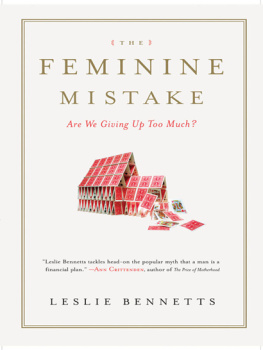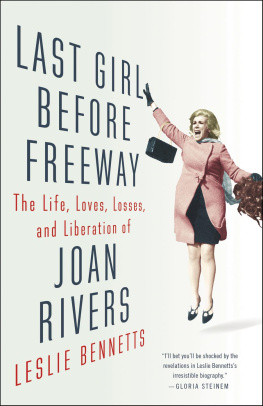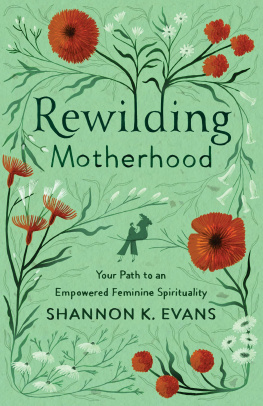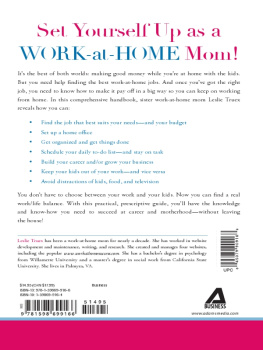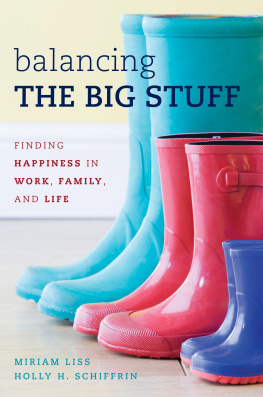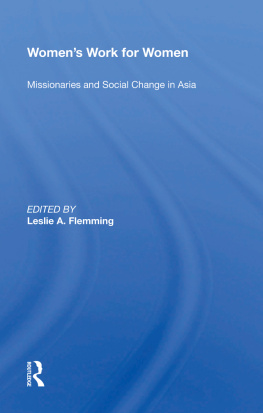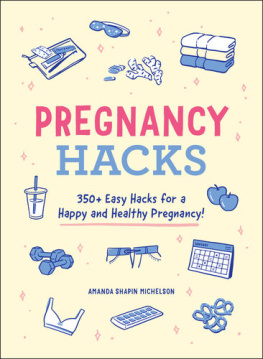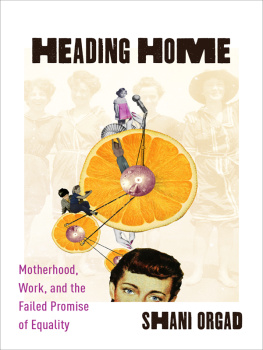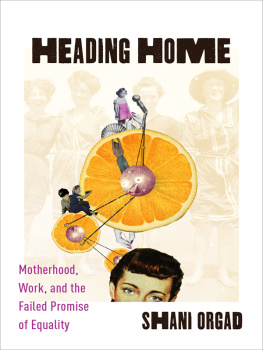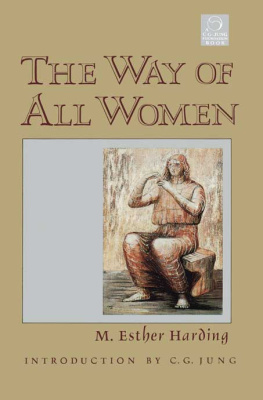Contents
Back to the Future
Opting Out
But What If...
Opting Back In
Risky Business
The Fifteen-Year Paradigm
Who Says It
The Joys of the Full Life
Its the Money, Honey
Men, Marriage, and Money
Home Equity
But What About the Children?
Backward Progress
The Anxiety of Liberty
This book is dedicated with my love to four extraordinary women:
To my mother, Chaucy Bennetts, who worked and raised her children with such strength and competence that I never questioned whether it was possible to combine a career and a happy family;
To my baby-sitter, Norma Mohabir Ingram, who cared for my children with unfailing love and contributed so much to the wonderful people they have become;
To Emily Gerard, my strong, brilliant daughter, in hopes that she will realize all her dreams and challenge any barriers that stand in her way;
And in memory of Betty Friedan, the visionary who first opened my eyes.
The Feminine Mistake was originally inspired by my exasperation at the public glorification of stay-at-home motherhood and the failure of the media and other analysts to warn women about the risks of sacrificing their financial independence. But a point of view, no matter how passionately held, is not a book, and I would like to thank my agent, Amanda Urban at ICM, for her invaluable contributions in developing this idea. Since we spent nearly a year arguing vigorously about what to do with it, her patience was as noteworthy as her suggestions were helpful.
During the early stages of this process, I also appreciated the enthusiasm of Hilary Black, Andrea Miller, and Elise OShaughnessy, whose support led to the initial Tango magazine essay that became the starting point for the book.
When I began to interview women about marriage, motherhood, and work, I was astounded by the willingness of complete strangers as well as friends and acquaintances to talk about the most painful feelings and difficult issues in their lives. This book would not exist without the riveting testimony of countless women as well as more than a few men, and I owe an immeasurable debt to them all for their candor in opening their hearts to a reporter. Their insights gave me a great deal of help in developing my understanding of these issues, and I am most grateful for the cooperation of everyone who consented to an interview, both those who are idd and those who asked me to protect their identities.
Many of the sociologists, economists, legal scholars, and other experts I interviewed were also kind enough to share their own experience as wives and mothers. I appreciated their time and generosity, and I found these personal histories from such accomplished women to be tremendously inspiring. I would also like to express a special thanks to Ann Lewis, Dorothy Weaver, and Mary Alice Williams for their input, and to Carrie Carmichael, Amanda Butterbaugh, and Laura Shapiro for introducing me to relatives and other women in the heartland.
Throughout this process, I felt fortunate that The Feminine Mistake would be published by Pamela Dorman, the editorial director of Voice at Hyperion, and Ellen Archer, the publisher. From the outset, they understood the importance of the information I wanted to present, and their excitement about my message was very encouraging. I appreciate the efforts of all the hardworking professionals at Hyperion/ Voice who contributed to this project.
But long before The Feminine Mistake, I was a working mother struggling to be a good parent as well as a productive journalist. I am forever grateful to Graydon Carter for my wonderful job at Vanity Fair magazine, which has permitted me to work at home, make dinner, and hear my kids after-school reports while meeting my deadlines all these years. I am also deeply indebted to Tina Brown, Graydons predecessor as editor of Vanity Fair, for hiring me while I was pregnant with my first child.
Many thanks as well to Judy DeYoung and to Kathryn Belgiorno for their painstaking work in fact-checking this book. Julia Simon provided research assistance that helped me to meet a ridiculously tight deadline.
Finally, and most importantly, I would like to thank my husband, Jeremy Gerard, for his crucial insights as my in-house editor, and my beloved children, Emily and Nick Gerard, for their patience, cooperation, and good humor about becoming part of this book. I love you more than I could ever put into words.
Leslie Bennetts
New York City
October 2006
M y grandmother made the worlds best rhubarb pies and sewed extraordinary silk garments with exquisite craftsmanship worthy of a French couturier. Raised to devote her all to marriage and family, she worshipped her talented husband, doted on her children, and baked homemade bread whose enticing aroma drew everyone to the kitchen. Although she lived for nearly eighty years, she never worked outside the home or held a paying job.
Such latter-day paragons of traditional femininity often make people nostalgic for bygone times, but even then, the truth was frequently a lot darker than the champions of conventional gender roles like to admit. Although my grandmothers life adhered faithfully to the old-fashioned stereotypes so often held up as a modern ideal, the result was a disaster, not only for her but also for her children and relatives.
In 1932, when my mother was nine years old, her father left the family for his mistress, a stylish black-haired beauty unencumbered by the mundane burdens of domesticity. For my grandmother, who came from a well-to-do family, the emotional devastation of losing her husband was exacerbated by the dizzying plunge into poverty that accompanied it. My grandfather was an architect who had done pioneering work with men like Philip Johnson and R. Buckminster Fuller, but employment was hard to come by during the worst years of the Depression, and he soon defaulted on his financial obligations to his wife and children.
Left with no means of support, my grandmother considered getting a job, but her straitlaced sisters pressured her not to do so. Firmly in thrall to the Victorian concept of separate spheres that divided the world according to gender, they believed that men should be the breadwinners and that womenor at least ladiesshould not work outside the home. If my grandmother began supporting herself, her sisters warned, that would absolve her husband of his familial responsibilities, and then he would never return to his wife and children. Best to wait until he got tired of that trollop, as my grandmother and her sisters referred to the Other Woman (who may have been an adulteress but was also a hardworking schoolteacher with considerably more modern ideas about womens place in the world).
The loss of her husband left my grandmother virtually paralyzed with grief; according to family lore, she simply went to bed for two years. My mothers older brother was soon out of the house, so my mother was left on her own to care for my deeply depressed grandmother. In addition to the emotional toll that entailed, the rest of my mothers childhood was blighted by one financial crisis after another as she and my grandmother were evicted from a series of increasingly shabby apartments, unable to keep up with the rent.
My grandmothers family owned a great deal of land out west, but as a woman she was deemed unable to manage her own affairs, so her only brother assumed control of her share of the family assets. Over time, he apparently managed my grandmothers property out of her id and into his own. As a result, she was forced to depend on the charity of her four sistersor, to be more precise, their wealthy husbandsfor support.

